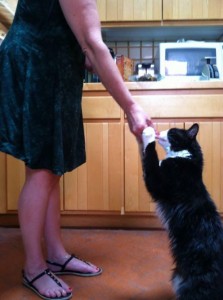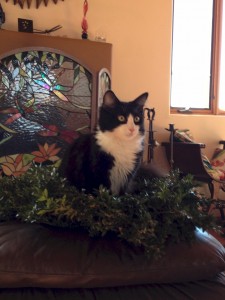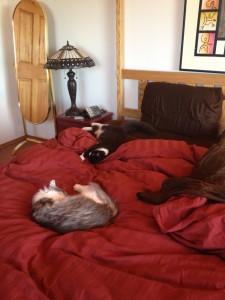 Jackson will take treats from my hand like this. He puts his paws on me to steady himself, then plucks the shrimp, or ham, or turkey, or salmon, or beef, or really any kind of meat at all, with his teeth. I’ve never had a cat that would do like this before.
Jackson will take treats from my hand like this. He puts his paws on me to steady himself, then plucks the shrimp, or ham, or turkey, or salmon, or beef, or really any kind of meat at all, with his teeth. I’ve never had a cat that would do like this before.
David says I was talking in my sleep a lot last night. That should come as no surprise, since I’m getting heavily back into drafting this novel. The big fantasy novels seem to do it to me much more than the shorter, erotic romance works. I’m not exactly sure why. Maybe because it’s more complex storytelling. Maybe because I’m constructing an entire world along with the story itself.
At any rate, it makes me aware of how much my mind works on this kind of thing. I also find I begrudge distractions more. It’s like I already have so many conversations going on in my head that I can’t bear to listen to any new ones. At times like this I understand the writers who lock themselves away in a cabin for a few weeks or a month, to focus only on the book. I try to keep my life as normal as possible, evenly moving along, but sometimes I envy that model.
Quiet is just so crucial.
A few weeks ago, I flew to Ohio to meet up with some CPs and go to a conference. It was a fairly long flight there – about 3 hours – and I happily found a window seat to ensconce myself in. I exchanged hello’s with the gal on the aisle and set about staging my supplies for the flight. I knew the week ahead would be busy enough that I wouldn’t get tons of writing work done and I hoped for some solid writing time during the flight. As the plane filled, another gal took the middle seat. She and the woman on the aisle kept going after the initial greetings. And going. And going.
I even tweeted, before they shut the plane doors, that I really hoped they wouldn’t talk the entire flight.
They did.
Non-stop.
Some helpful Tweeters predicted this and suggested I go for ear buds early. Fortunately I could. I plugged in the music, opened my laptop and worked away. Every now and again – like when I removed my ear buds to talk to the flight attendant about what lovely drink she could bring me – I became aware that the conversation continued apace.
No, I have no idea what they found to talk about for that long.
But they had gone from total strangers to BFFs within minutes. At the end of the flight, once they stood, they reverted to strangers, as airline passengers do. We all wait, sitting, standing, half-stooped because the overhead bins are in the way, not making eye contact, pretending we aren’t Hugely Impatient to get off the stinking plane already. They went their separate ways without another word.
The new found connection was apparently just to pass the time.
I notice that, the deeper into creating I am, the less I want to talk. It’s like I have energy for the one thing or the other. I think that’s worth exploring. I rarely have good advice when people ask me about solving writer’s block or increasing productivity or enhancing creativity, but there’s something.
Try talking less.
It might feel weird at first. Maybe lonely. Maybe TOO quiet. But I do believe that, once you create that silence in your mind, other things will come to fill it.
Ideas.
Images.
Stories and characters and worlds.
Shh…
Hear that?






